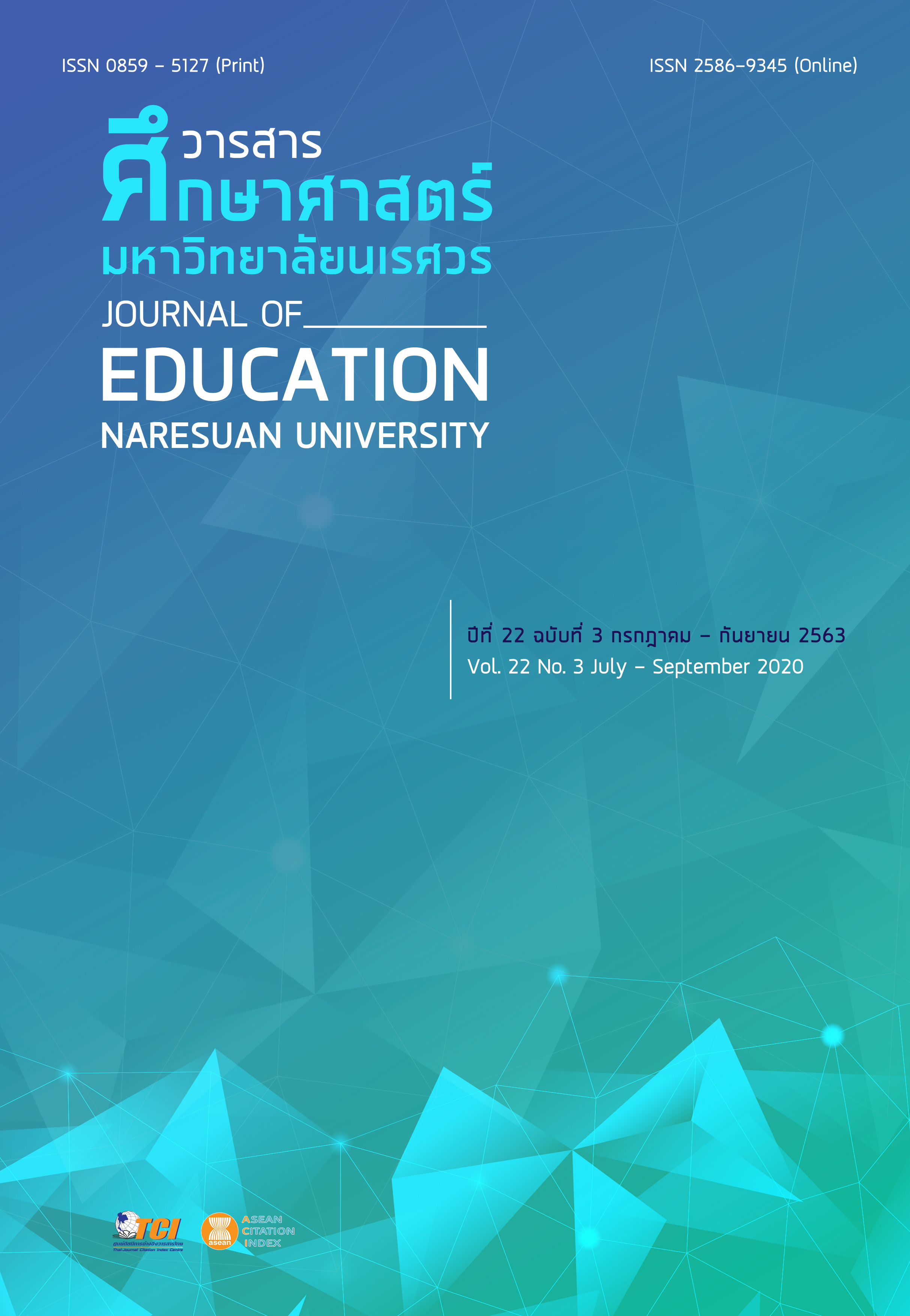DEVELOPMENT OF EARLY CHILDHOOD CHILDREN'S RESPECTFUL MIND IN MULTICULTURAL CONTEXT การพัฒนาจิตรู้เคารพของเด็กปฐมวัยในบริบทพหุวัฒนธรรม
Main Article Content
Abstract
This research aimed 1) to design early childhood children’s respectful mind in multicultural context learning experience plans, 2) to study early childhood children’s respectful mind behaviors in multicultural context, and 3) to study learning achievement about culture and tradition of early childhood in multicultural context. The target group was kindergarten students who studied at Mettachanupatum School, Lom Sak District, Petchaboon Province includes 27 students who are 18 Lomsak native students and 9 Hmong native students. The instruments used in this study consisted of 1) early childhood children’s respectful mind in multicultural context experience learning plans, 2) behavior assessment form of early childhood children’s respectful mind in multicultural, and 3) Learning achievement test form about culture and tradition of early childhood in multicultural context. The data was analyzed by percentage. The results found that:
1. There were four units of early childhood children’s respectful mind in multicultural context learning experience plans with the integration of six activities addressed in the curriculum. The four units consisted of unit 1: 5 plans of Prasart Poung Parade, unit 2: 5 plans of Pakhao Yong Custom, unit 3:
5 plans of Hmong New Year (1), and unit 4: 5 plans of Hmong New Year (2) for 4 weeks. Designing plans focus on student center learning and social interaction of students that based on Respectful mind of Howard Gardner. After using plans, found that each plans are appreciated for learning activities to develop respectful mind of students.
2. Respectful mind behavior of found that students understand in own culture and different culture. They’re early childhood children respected other one and accept in deference between individuals, include learning with other as well. The assessment score before using the plans was at 41.09% and after learned with those plans respectful mind behavior score was at 66.31%. The score was higher than pre-assessment at 25.22%. The respectful mind of early childhood children was developed as the purpose of this research.
3. Learning achievement about culture and tradition of early childhood children in multicultural context found that students understand in content of local custom in multicultural context on objectives each plans. All units scores were at the average of 79.76% which higher than the set criteria of 70.00%.
Article Details
The owner of the article does not copy or violate any of its copyright. If any copyright infringement occurs or prosecution, in any case, the Editorial Board is not involved in all the rights to the owner of the article to be performed.
References
Banks, J. A., & Banks, C. A. (1994). Multicultural education: Issues and perspective (2nd ed.). Boston: Allyn & Bacon.
Boonyanusit, K. (2011). Development of instructional model for enhancing respectful mind and ethical mind based on teaching and learning VIA service learning for undergraduate students (Doctoral dissertation). Bangkok: Srinakharinwirot University. [in Thai]
Bureau of Academic Affairs and Educational Standards. (2003). Early childhood education curriculum 2546. Bangkok: Ministry of Education. [in Thai]
Deachacope, P. (2007). Skill 5C for developing unit learning ang integrated instructional management (17th ed). Bangkok: Chulalongkorn University. [in Thai]
Gardner, H. (2008). Five Minds for the Future. (Acsawatawawich, S., & Makhasiranon, W., Trans.). Bangkok: Expernet. [in Thai]
Khemmani, T. (2013). Teaching science: Knowledge for the development of learning process (17th ed). Bangkok: Chulalongkorn University. [in Thai]
National Education Act of E.D. 2542. (2010, 22 Jul). Royal Thai Government Gazette. No. 27 part 45a. p.1. [in Thai]
Kolomim, K., Namnak, C., Kaewurai, W., & Thumrongsothisakul w. (2014). A development of learning model based on constructivist theory of a scaffolding to enhance mathematic problem solving skill for lower for the Mattayomsuksa 1. Journal of Education Naresuan University, 16(2), 129-133. [in Thai]
Miller, R., & Pedro, J. (2006). Creating Respectful Classroom Environments. Early Childhood Education Journal, 33, 293-299.
Nanthaburom, S., & Sarankura Na Ayudhaya, W. (2015). Effects of using prejudice reduction activities based on multicultural education on understanding diversity in races, religions and cultures among the cultures in the ASEAN Community of Upper Secondary School Students. Journal of Education Studies, 42(1), 139-154. [in Thai]
Panich, V. (2012). 21st Century Learning Path for Disciples. Bangkok: Sadsri-Saritwong Foundation. [in Thai]
Sarattana, V. (2013). New paradigms in education perspectives on 21st century education. Bangkok: Thippayawisood Limited Partnership. [in Thai]
Subcommittee on Academic Reform. (2000). Learning reform the most important lesson. Bangkok: Office of the National Education Commission. [in Thai]
The Secretariat of the Council of Education. (2009). The performance of early childhood development in 3-5 years: Recommendations for caregivers and teachers. Bangkok: Plan for Kids. [in Thai]
Tongthawon, R. (2014). Model of constructivism experience for early childhood children. Chiang Mai: Faculty of Education, Chiang Mai University.


